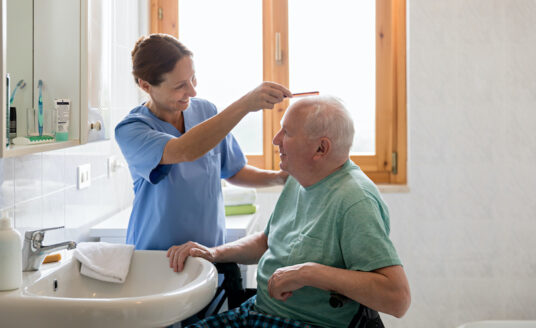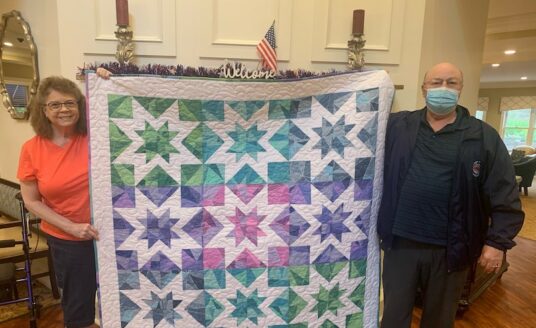Caring for a senior loved one can be a rewarding experience, but comes with great responsibility. And that responsibility often increases as the senior advances in age.
Unfortunately, often caregivers don’t plan ahead regarding their loved one’s long-term care. Rather, they react out of compassion when their senior loved one needs help. Planning will help determine how the caregiving process will take place and who else besides you, the primary caregiver, could and should be involved.
The best caregiving situation for all involved, including the senior, is a care partner team. Take these tips for caregivers into consideration:
Putting a Care Partner Team Together
If you are considering serving as the primary caregiver for your senior loved one, you will need to assess the time, energy and qualifications you can bring. You will want to discuss this with your own family, as they too will make sacrifices due to your absence.
You should also consider which other family members and friends could serve as care resources at times when you are not available. Who else could take your senior to doctor appointments? Do you know someone who is savvy with financial or legal affairs that can assist with wills and other important documents? Who will oversee the paying of bills, taxes, and health care insurance? Is there a physician in the family who can provide medical advice?
When this has been determined, you should gather and discuss the current care needs of your senior loved one, and physician recommendations and prognosis for the care required for the senior in the future.
Here are some tips for caregivers to keep in mind:
- Make a list of who has volunteered for what duties. Write down what they have agreed to do, along with their contact information. Keep in mind that as the senior’s needs change, the duties and responsibilities will need to be adjusted. One note of caution: a family member or friend who is qualified and has the time to lend a hand is not a good option if they bring with them a negative attitude when asked to help. Find someone who wants to pitch in.
- Make a list of tasks that you can assign when needed. Grocery shopping, lawn care, housework, laundry, cooking, or staying with the senior to give you a much-needed break are important tasks in providing well-rounded care for the senior as well as yourself.
- Use social media to stay in touch with your care partner team. Zoom video conferences can provide a great forum for multiple members to discuss and compare notes.
Look Outside of Family and Friends
Care Management teams assist patients and their support systems in managing medical conditions more effectively. It also encompasses those care coordination activities needed to help manage chronic illness.
Community-based support and services are wide ranging and can include the following:
- Transportation
- Personal care
- Homemaker services
- Nutrition education
- Adult day care
- Case management
- Household tasks assistance
- Legal assistance
- Respite care (to give the caregiver time away from the senior’s home)
- Counseling and support groups
USAging is a good place to start to find these support services in your area and additional tips for caregivers.
There are also professional caregivers that provide a host of services that can also be a part of your care partner team. Some provide transportation needs, medical supervision, respite services, housework, and help with daily activities like bathing, grooming, and toileting.
Care managers are experts in recognizing the needs of seniors and finding the resources to meet those needs. These care managers can put together a care plan and become as involved as the family wants or needs them to be.
The list of professionals to consider to be a part of the team is lengthy yet comprehensive:
- Physicians (primary care and specialists)
- Elder law attorneys
- Care managers (also known as aging life professionals)
- Social workers
- Financial advisors
- Pharmacists
- Home care agencies and professional caregivers
- Adult day care centers
- Charities, organizations, and support programs
- VA, Medicare and/or Medicaid advisors
Apps for Organizing Care
There are a number of apps that support caregivers and care partner team members. These apps help you:
- Maintain and update important information
- Record appointment and medications reminders
- Keep a log of activities
- Coordinate the responsibilities among the various caregivers
- Keep a record of the conversations from appointments with doctors or other care providers
- Stay in touch with members of the care partner team.
What You Need
As a caregiver, what you need most is good advice, responsibility sharing among care partner team members, and some extra hands in the day-to-day management of your senior’s care. Because that’s what a care partner team is all about.
Are you new to senior caregiving? Check out our Caregiver Tips blog to find more resources.
| Whether in independent living, assisted living, memory care, or skilled nursing, Bethesda offers the right amenities, services, programming, and staff to make every day full of purpose. See for yourself and tour our independent living communities, including Bethesda Barclay House – Clayton, Bethesda Gardens – Kirkwood, Bethesda Orchard – Webster Groves, Bethesda Terrace – South County, Village North Retirement Community – Florissant, and The Oaks at Bethesda Villas – Kirkwood/Webster. |
Want to find out more?
If you’d like to stay up to date with Bethesda Health Group, sign up here to receive our blog and newsletters!
"*" indicates required fields
Related Articles
Want to find out more?
If you’d like to stay up to date with Bethesda Health Group, sign up here to receive our blog and newsletters!
"*" indicates required fields



